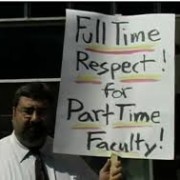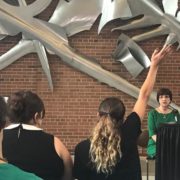 Professor Rosalind Gill of Kings College London explores how the pressures of the neoliberal university often leave faculty dealing with “exhaustion, stress, overload, insomnia, anxiety, shame, aggression, hurt, guilt and feelings of out-of-placeness, fraudulence and fear of exposure within the contemporary academy.”
Professor Rosalind Gill of Kings College London explores how the pressures of the neoliberal university often leave faculty dealing with “exhaustion, stress, overload, insomnia, anxiety, shame, aggression, hurt, guilt and feelings of out-of-placeness, fraudulence and fear of exposure within the contemporary academy.”
One of the issues Gill addresses is “precariousness” experienced most keenly by younger faculty, particularly younger women:
It is perhaps the same ‘sacrificial’ ethos that silences accounts of the personal costs of insecure and precarious work within universities. Having to commute long distances, or to live apart from partner and friends, are among these, as we become an increasingly mobile, fragmented workforce. Another cost for some is not being able to have children. This impacts disproportionately on female academics who, it would appear, are significantly less likely to have children than both their male counterparts in academia, and women in other types of employment (Nakhaie, 2007, Probert, 2005). Part of this difference may be accounted for in terms of the lower numbers of female academics who want children, but recognition of this should not blind us to the fact that increasing numbers also feel unable to do so and sustain an academic career, either because the length of time it takes to get a secure job (degree, Masters, PhD, series of temporary contracts) makes it too late, or because the intense day-to-day demands of contemporary academic employment make it extremely difficult to manage. A study at the University of California found that women academics with children were working 100 hours per week, when housework and childcare was added to academic labour (Mason et al., 2006). It might be argued that the rapid influx of women into academic positions within universities in the last 30 years has come at the cost — for some of them — of having families. This resonates with experiences in other occupational fields (e.g. journalism) in which there are trends towards gender equality, but in which more complex forms of discrimination and inequality are emerging.
The full text appears below with the permission of the author.
[pdf-embedder url=”http://futureu.education/wp-content/uploads/2015/08/hidden-injuries-of-neo-liberal-academia.pdf”]



